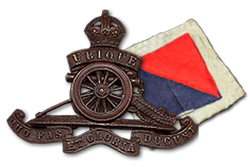2nd Anti-Aircraft Division (United Kingdom)
| 2nd Anti-Aircraft Division | |
|---|---|

Royal Artillery cap badge and AA patch
|
|
| Active | 15 December 1935 – 1 October 1942 |
| Country |
|
| Branch |
|
| Type | Anti-Aircraft Division |
| Role | Air Defence |
| Part of |
Northern Command (1936–39) Anti-Aircraft Command (1939–40) 2 AA Corps (1940–42) |
| Garrison/HQ | RAF Hucknall |
| Engagements | The Blitz |
The 2nd Anti-Aircraft Division (2 AA Division) was an Air Defence formation of the British Army from 1935 to 1942. It controlled anti-aircraft gun and searchlight units of the Territorial Army (TA) defending the East Midlands and East Anglia during The Blitz.
In December 1935 the TA's 46th (North Midland) Division (which also acted as HQ for the North Midland Area of Northern Command) was disbanded and its headquarters was converted into 2nd Anti-Aircraft (AA) Division to control the increasing number of AA units being created. At first it administered all AA units in Great Britain outside London and the Home Counties, which were covered by 1st Anti-Aircraft Division. The new division was first organised at York, but shortly afterwards took over 46 Division's HQ at Normanton, Derby.
By the end of 1936 the division had the following order of battle, though many of the units were in an easily stage of formation or conversion:
General Officer Commanding: Major-General James Harrison
40, 41, 42, 44 and 46 AA battalions had previously been infantry battalions in 46th Division.
In 1938 the Royal Artillery replaced the traditional unit designation 'Brigade' by 'Regiment', which allowed the AA Groups to take the more usual formation title of Brigades.
The TA's AA units were mobilised on 23 September 1938 during the Munich Crisis. Because the organisation of 2 AA Division and its component units was not yet complete, it was only partially mobilised. The emergency mobilisation lasted nearly three weeks before the TA units were released on 14 October. The experience led to improvements in equipment scales, and a rapid expansion of AA defences brought many new AA gun and searchlight units into existence. In November 1938, 31 and 33 AA Bdes transferred to the newly formed 7th Anti-Aircraft Division and 4th Anti-Aircraft Division respectively. In 1939, 30 AA Bde also joined 7 AA Division. They were replaced in 2 AA Division by new brigadescreated in September 1938: 39th at Retford in Nottinghamshire and 40th and 41st in London. 39th AA Bde also transferred to 7th AA Division just before the outbreak of war. In April 1939, AA Command was formed to control all the AA gun and searchlight defences of the United Kingdom.
...
Wikipedia
